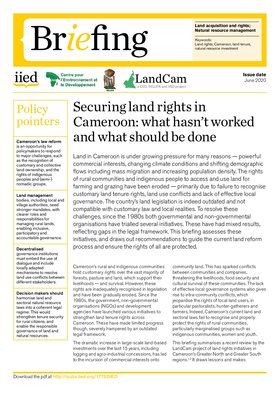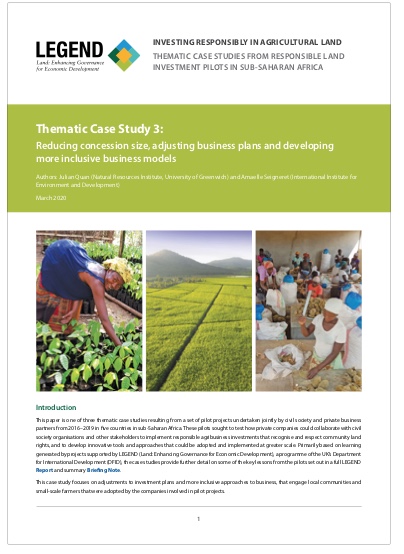Focal point
Location
Mission
Our mission is to build a fairer, more sustainable world, using evidence, action and influence in partnership with others.
Who we are
IIED is one of the world’s most influential international development and environment policy research organisations. Founded in 1971 by economist Barbara Ward, who forged the concept and cause of sustainable development, we work with partners on five continents. We build bridges between policy and practice, rich and poor communities, the government and private sector, and across diverse interest groups. We contribute to many international policy processes and frameworks, including the Intergovernmental Panel on Climate Change, the Millennium Ecosystem Assessment and the UN conventions on climate change and biological diversity.
What we do
IIED carries out research, advice and advocacy work. We carry out action research — generating robust evidence and know-how that is informed by a practical perspective acquired through hands-on research with grassroots partners — and we publish in journals and maintain high research standards. We advise government, business and development agencies, and we argue for changes in public policy. We focus on bottom-up solutions, stay open to flexible, adaptable solutions and are marked by a tradition of challenging conventional wisdom through original thinking.
Resources
Displaying 41 - 45 of 367Farmer-herder conflict in Africa: re-thinking the phenomenon?
Looks at the dynamics of environmental displacement;land rights and conflict in the aftermath of the Cyclone Idai in Mozambique in March 2019;and at the role of international and national legal frameworks in addressing land-related problems caused by this displacement. Land rights issues such as the need to displace people from high-risk areas bring another layer of problems to climate change adaptation.
Securing land rights in Cameroon: what hasn’t worked and what should be done
Thousands of families are being evicted from their farms to make way for foreign-owned farms in Kiryandongo;western Uganda. Three multinational companies – Agilis Partners;Kiryandongo Sugar Limited and Great Season SMC Limited – are involved in grabbing land;violently evicting people from their homes and causing untold humiliation and grief to thousands of farming families residing in Kiryandongo district.
Securing land rights in Cameroon: what hasn’t worked and what should be done
Land in Cameroon is under growing pressure for many reasons — powerful commercial interests, changing climate conditions and shifting demographic flows including mass migration and increasing population density. The rights of rural communities and indigenous people to access and use land for farming and grazing have been eroded — primarily due to failure to recognise customary land tenure rights, land use conflicts and lack of effective local governance. The country’s land legislation is indeed outdated and not compatible with customary law and local realities.
The future of land: commercial pressures and the case for systemic law reform to secure rural land rights
This study examines how Senegalese CSOs operating within the framework for dialogue and action on land in Senegal (CRAFS) mobilised around the process of formulating a draft land reform;led by the National Land Reform Commission (CNRF) between 2014 and 2016. After describing how members of CRAFS contributed to the debate on the need for an inclusive land reform and their active and critical contributions to the CNRF process;the paper analyses the achievements and limitations of their engagement in the process and the lessons learned from it.
Reducing concession size, adjusting business plans and developing more inclusive business models
This paper is one of three thematic case studies resulting from a set of pilot projects undertaken jointly by civil society and private business partners from 2016–2019 in five countries in sub-Saharan Africa. These pilots sought to test how private companies could collaborate with civil society organisations and other stakeholders to implement responsible agribusiness investments that recognise and respect community land rights, and to develop innovative tools and approaches that could be adopted and implemented at greater scale.






